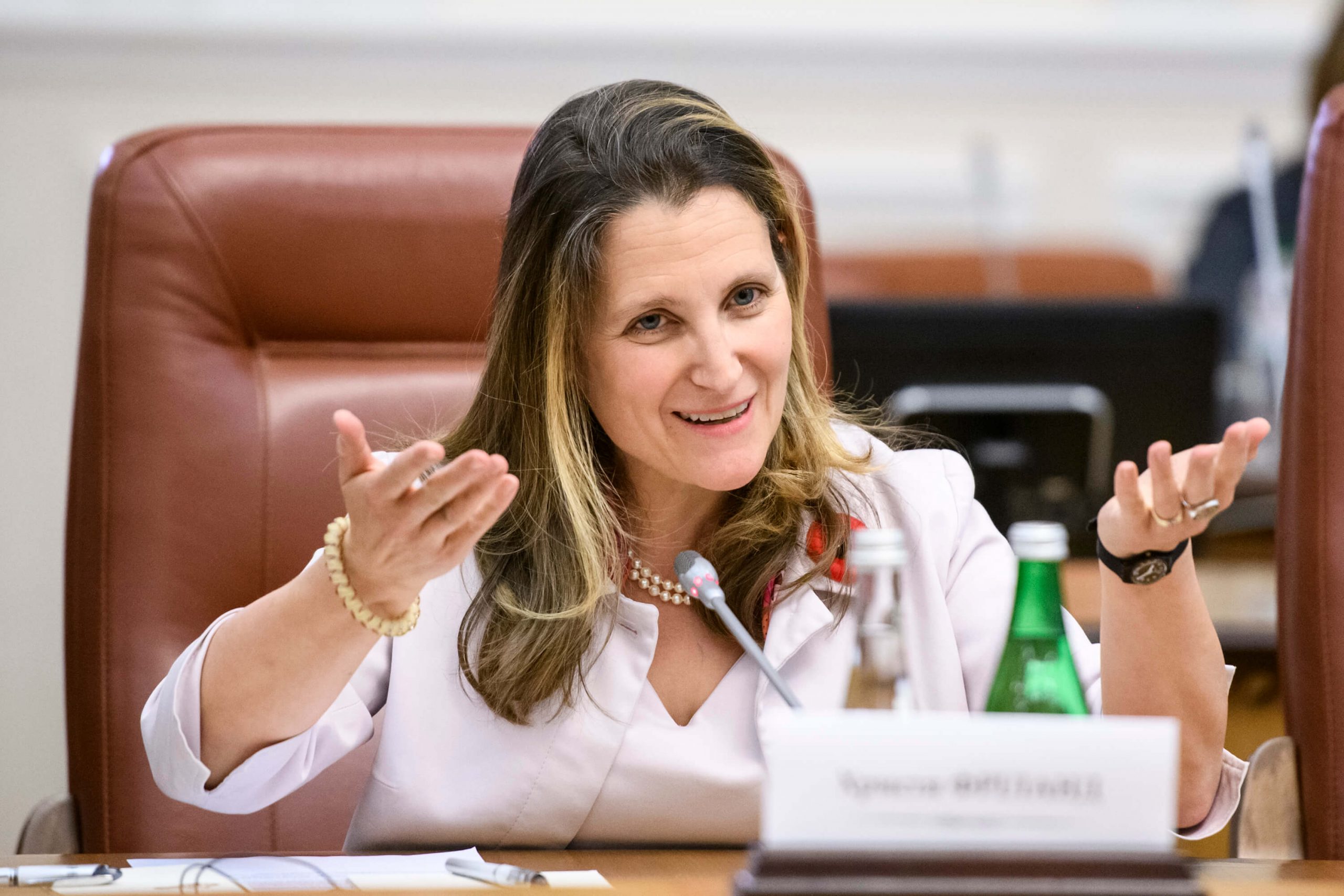10 Lessons from listening to Chrystia Freeland, a seriously “good talker”
by Shari Graydon
Кабінет Міністрів України / CC BY (https://creativecommons.org/licenses/by/4.0) https://commons.wikimedia.org/wiki/File:Prime_Minister_Volodymyr_ Groysman_met_with_Minister_for_Foreign_Affairs_of_Canada_Chrystia_ Freeland_-_2019_(MUS0136).jpg
The prospect of being interviewed on live radio or television makes many participants in our workshops nervous. But none of them have had to negotiate the kind of high-wire crossing in real time performed by our newly appointed Finance Minister, Chrystia Freeland.
And she has, time and again, demonstrated her qualifications as — in radio producer parlance — a “good talker” — aka an on-air guest who speaks clearly and fluidly, is at once authoritative and accessible, and able to respond to tough questions without defensiveness or resorting to an embarrassingly transparent repetition of pre-crafted message box platitudes.
During the North American free trade negotiations she led on behalf of Canada as Minister of Foreign Affairs, she was interviewed multiple times about both the process and the outcome of the trade talks. In those conversations she had to demonstrate knowledge of an array of complex issues, and avoid saying anything that might be deemed an insult by the notoriously media-obsessed and Twitter-trigger-happy commander-in-chief.
Not only did she succeed in maintaining a respectful tone and avoiding the multiple traps that such a scenario presented, she also demonstrated text-book interview finesse.
Here are just a few of the lessons that listening to her conversation with Chris Hall, host of CBC Radio’s The House, offer to those aiming to become more effective themselves when speaking with journalists:
- She responds crisply off the top: Freeland’s response to Chris Hall’s first question — “What’s the endgame?” is a clear, concise and effective 10-seconds: “The endgame is for the United States to remove its illegal and completely unjustified tariffs on Canadian steel and aluminum.”
- She repeatedly avoids criticizing individuals: Hall’s second question asks her to comment on what will get through to Donald Trump and Wilbur Ross that they’re doing “the wrong thing”. She immediately bridges to what she’s “been really glad to see.” Towards the end of the conversation, when invited again to criticize a man who makes not doing so difficult, she says,“I will let President Trump speak for himself, but I speak for Canada…”
- She explicitly flags her two points: This cues both the host and the audience to listen for the “couple of things” she wants to share, letting us know a longer answer is coming but making clear that she knows where she’s going, and increasing our attentiveness.
- She effectively deflects hypotheticals: When asked to comment on why US politicians would adopt stances that appear to undermine the interests of their citizens, she replies, “I wear many hats but being a psychologist is not one of them.”
- She bolsters her government’s position by citing endorsements: At various points in the interview, she invokes the names of prominent US politicians supportive of Canada’s position, as well as our country’s strong alliance with the European Union. She also frames the policies she’s advocating as being consistent with “Canada’s foreign policy since the Second World War,” effectively undercutting partisan attacks from opposition politicians.
- She challenges language that characterizes the situation in a way she sees as unhelpful: When Hall asks “Are you confident we can head off a trade war?”, she responds by saying, “I don’t like using militaristic language,” and then bridges to “What I am confident about is…”
- She moves easily past a correction: When Hall corrects her characterization of something the PM has said, veering into more risky territory, she simply pauses, replies, “Indeed,” and then moves on to her next point, not getting caught up in an unproductive clarification or back and forth.
- She grounds her argument in relatable terms: She references the potential impact of the US tariffs in ways that allow the audience to picture the consequences, saying: “US consumers are going to pay more… US companies will be less competitive…”
- She doesn’t let the journalist put words in her mouth: When Hall restates her point about offering steel and aluminum workers “the same kind of support” as the government did those in the softwood lumber sector, she firmly restates, “No: the situations are very different, but the principle is the same.”
- Her demeanor is warm and conversational: Notwithstanding the push-back she’s making, she does it with grace. You can hear the smile in her voice when she says, “We’re on radio so people can’t see Chris, but I can, and he’s just frowned at me,” before going on to explain why she interjected to challenge his mischaracterization of her point.
Most of the women we train are scholars, business executives, lawyers or non profit leaders. As such, the potential consequences of being misquoted or misunderstood may not result in the kind of international or fiscal shock waves that Minister Freeland faces.
But we can all learn a lot from her mental and verbal agility, her ability to hold her own on the interview dance floor, avoid being led into dark corners, or pulled into unflattering moves, and effectively deliver the messages she believes are most useful to enhance Canadians’ understanding of complex issues of major importance.
Shari Graydon is the Catalyst of Informed Opinions, a non-profit working to amplify women’s voices and ensure they have as much influence in Canada’s public conversations as men’s.
We train smart women to speak up more often and more effectively.
We make them easier for journalists to find.
And we issue charitable receipts to those who support our equity-focused work.
